How Wicked Taught Me to Stand Against Authoritarianism By Being Myself
How Elphaba’s Authenticity Threatens Authoritarianism Part 1
“Are people born wicked? Or do they have wickedness thrust upon them?”
- Glinda the Good, No One Mourns the WIcked
A client once asked me, “When is it the right time to let go of people who won’t accept me?”
Knowing that they are lactose intolerant, I humorously respond, “How much did you have to shit yourself before realizing you should give up cheese?” We both laughed, and the lesson landed: The suffering stops when we decide we are done suffering. Yet, this is easier said than done. When you spend a lifetime prioritizing the esteem and acceptance of others, regardless of how they treat you, it isn’t so simple as choosing to be yourself. In fact, the journey towards self-discovery is fraught with challenges, abandonment, grief, and - ultimately - liberation.
To that end, it’s clear why I find myself identifying so heavily with the character of Elphaba from Steven Schwartz’s musical rendition of Gregory Maguire’s book, Wicked. As a military brat, I moved a lot, especially during my formative years. The first few chapters of my life were on a US Naval base in Japan, before moving to California, and ultimately landing in Southern Maryland. That coupled with being a third culture kid, I was destined to have this painful hole in my heart. Always on the outside looking in. Never quite Filipino enough for my heritage, and not quite American enough for Americans. Too Asian for California. Too West Coast for Maryland. It’s no wonder that much of my life was spent craving fame and acclaim.
When you spend a lifetime hiding yourself from others for the sake of fitting in, it’s only natural that you desperately seek validation from anyone and everyone who will give it to you. Much in the way that Glinda performs constantly to receive the attention and approval of others. Regardless of whether it causes harm to anyone. Meanwhile, Fiyero chooses to disregard the game of societal approval entirely, instead seeking to live a frivolous, and nihlistic life. Similarly, Elphaba so badly craves acceptance and fitting in, singing how badly she wants to be celebrated all thorugh Oz, and maybe even be “degreenified” by the Wizard.
That’s where things get wicked (pardon the pun). Between the powerhouse scores, incredible choreography and Jonathan Bailey’s zestiness is a powerful message: only those who conform to The Wizard’s Worldview are allowed to live “free.” Anyone who goes against the status quo will be ostracized and punished. And, if you are special enough to stand out, you will be taken into the Wizard’s inner circle, and help maintain his Authoritarian Rule behind the glittering walls of the Emerald City. Within this context, Authenticity over Attachment isn’t just about thriving in your tiny slice of the world, but about standing up, unabashedly, against Authoritarianism. Still, before we dive into the power of authentic expression, we must first dig deep into the authoritarian regime that has existed long before Elphaba, Glinda, and Fiyero’s days at Shiz.
How a Crisis Breeds Compliance
"We’re doing this to keep people safe, all of Oz will benefit"
- Madame Morrible
People often think that Fascism sprouts up out of the ground. One day everyone wakes up, Nazi salutes to Herr Wizard, and whoops, now Fascism is here! In actuality, it is done in little moments, first and foremost by making hurtful policies seem appealing. The Wizard was, and always has been a con artist. He knows that power isn’t derived from outright fear-mongering, but by first leading with kindness, splendor, and extravagance. No one would be interested in the random man from Omaha Nebraska, but a legendary Wizard who can make any wish come true? Now that is someone you want to believe in. In the words of Chicago’s Billy Flynn, “Razzle Dazzle them, and they’ll never catch wise.” Yet, to establish his rule of law, he first needed something incredibly important: A crisis.
“Some of us are different. Now, you may have noticed that I am one of the last animal professors here at Shiz. And it isn’t encouraged to discuss this in our classes, but there have been some great changes throughout Oz with the rejection of animal culture. However, there was a time before you were born, when life in Oz was different. When one could walk these halls and hear a snow leopard solving an equation, or an antelope explaining a sonnet. So, when, and why did this change?” - Dr. Dillamond
“From what I’ve read the great drought.” - Elphaba.
“Precisely. Food grew scarce. And when people are hungry and angry, well they begin to look for-” Dr. Dillamond.
“Someone to blame.” - Elphaba
There are some theories that Madame Morrible, the Weather Witch, actually caused the drought, either on purpose or accidentally, and together with the Wizard they were able to accumulate power with the perfect scapegoat. Yet, why would people so easily turn on another species of creature they have lived side by side with? And why would they joyously dance and sing their ways into a totalitarian world if it isn’t serving the collective? For that we look to the words of Existential Psychologist, Rollo May.
“When a nation, rather, is prey to insupportable economic want and is psychologically and spiritually empty, totalitarianism comes in to fill the vacuum; and the people sell their freedom as a necessity for getting rid of the anxiety which is too great for them to bear any longer.”
The people of Oz were suffering. From the Munchkinland to Winkle Country, all of the humans were going without, and The Wizard took advantage of this. While it is never shown on screen, it is implied heavily that The Wizard took advantage of the human citizens’ resentment of the Animals to empower his influence. He built an entire cult of personality around himself, and developed an ideal goal for all: become worthy of meeting The Wizard, and your wildest dreams would come true.
“Elphaba when I first got here, there was discord, there was discontent. And back where I come from, everybody knows that the best way to bring folks together is to give them a…a real good enemy.” - The Wizard
What makes one worthy of meeting The Wizard? For that we look to Shiz Academy.
You’re Gonna Grin and Bear It, Your New Found Popularity
"I know about popular, and with an assist from me, to be who you’ll be. Instead of dreary who you were, well, are. There’s nothing that can stop you from becoming popu-ler…lar"
- Galinda, Popular
During their first moments at Shiz Academy, Elphaba desperately tries to save her sister, Nessarose from Miss Coddle’s overbearing…coddling, she launches a bench at an emblem of The Wizard himself. In its wake a hidden image reveals itself, showcasing a group of animals all clad in different accouterments indicating that they were the school’s original founders and educators. If it is your first time watching Wicked you may have missed it, but upon a second watch the message is clear: If you don’t fit in with the Wizard’s world view of order and splendor, then you do not belong. How do you get an entire culture to accept your otherworldly views? By targeting education, and the culture it builds. Then there will be people conditioned to uplift, and maintain that same, oppressive, culture, paint it in bright colors, and call it the status quo.
Let’s start with the spectacular diva clad in pink with a powerhouse voice, and kicks for days: Galinda. The woman who would one day grow up to be Glinda The Good Witch of The North is the quintessential “IT” girl at Shiz Academy. Virtually everyone she meets is immediately charmed by her, and everyone either wants to be with her, or to be her. I remember witnessing people like Galinda during my own school days. I would stand in awe as I saw how easily they befriended others, and the ways in which people flocked to them. I longed to be seen and held in such high esteem. Yet, I was an outsider, it wasn’t something that I was built to be a part of. Maybe I needed to better perfect my hair toss technique?
From the beginning of the musical Galinda is so clearly beloved. As she drops down from up high in her pink bubble, the crowd of Munchkins encircle her, praise her, and celebrate her as she sings her beautiful, operatic melody. The fact that the Wicked Witch of the West is dead isn’t a reality until she assures them that it is. She’s fully empowered by the adoration that they give her, and this power extends far beyond her current role as The Good Witch, but is something that she has enjoyed and appreciated since her days at Shiz.
As we flashback to Galinda’s early days at Shiz, we can see the excitement with which she perceives the world around her. Galinda flutters her way through life as though she is anointed by the Wizard himself, believing herself worthy for simply being her. Which - in the eyes of all around her - is absolutely reasonable. After all, she is Galinda Upland, “of the Upper Uplands.” With her blonde hair, petite frame, beautifully melodic voice, she at least appears to be a liberated being. That is until she is confronted, head on, with conflict in the form of Elphaba. While initially shocked at Elphaba’s green appearance. She collects herself, after all, a pure being like Galinda doesn’t reject anyone, at least not in front of so many people. While no one would judge her for being “disgustingified” by Elphaba, it is not enough for Galinda to be part of the rabble. She must rise above her conflict, and be the bigger person. Yet, it doesn't quite go as planned.
Galinda: It is my intention to major in sorcery. So, if it at some point, you wanted to address the, um…problem.
Elphaba: Problem.
Galinda: Perhaps I could help.
The crowd cheers and celebates Galinda’s kindness.
Elphaba: Offering to help someone that you don’t know, with skills that you don’t have, I’m sure everyone is duly impressed.
Galinda: I could care less what other people think.
Elphaba: Couldn’t.
Galinda: What?
Elphaba: You couldn’t care less what other people think…though I doubt that.
Shaken, Galinda immediately runs to her possie for assurance that she is a decent person. Having presumably never before faced rejection from anyone, Galinda’s worldview is cracked, and she faces further damage to her identity when Madame Morrible chooses Elphaba over her as the sole pupil in her Sorcery program. Once again, Galinda is forced to confront a frightening reality: She doesn’t have much to offer without the esteem and acceptance of others. Still, she doubles, and triples down on her performative allyship. She even spontaneously changes her name from Galinda, to Glinda, in hopes of receiving her boyfriend’s attention and approval.
The fascinating thing about popularity is that it can transform someone into a caricature of themselves. Self-esteem is no longer drawn from an inner strength, and deep knowing of what your boundaries and beliefs are, and instead - your self-identity is thrown to the winds of fate and fair-weather “friends.” Your popularity is given by the people, and the standards you must follow are set by the established forces and rules of the world you live in. Galinda falling apart and leaning on assurance from Bowen Yang’s Pfannee, and Brownyn James ShenShen, reflects a person who - at the end of the day - doesn’t really know who they are outside of the character they are playing. To the point that she perceives transforming Elphaba into a “popular” caricature as a kindness rather than a cruel subjugation of Elphaba’s authenticity and agency. Even while a part of her knows that Elphaba wouldn’t be comfortable with that level of masking as she proudly proclaims at the end of her solo “You’re gonna grin and bear it, your new found popularity.” To Galinda, the trick is to play the game, and recognize that only those who are popular have any real power.
This comes full circle when you refer back to the opening of the film. Glinda is fully grieving the death of her dear Elphaba, and yet - she must maintain the facade that she is everything antithetical to Elphaba to maintain her fragile hold on her authority and power. This is evident in the way she sings higher, and higher notes as “No One Mourns the Wicked” crescendos. In fact, the original Galinda, Kristen Chenoweth, has gone on record to express that the deeper Glinda sings, the more authentic she becomes. Yet, she’s trapped now in this role she played, because to lean into how she truly feels, is to give up the safety that comes with her popularity. In contrast, what happens when someone has little interest in playing the popularity game?
Numbing Yourself By Dancing Through Life
“Dancing through life, down at the Ozdust! If only because dust is what we come to. Nothing matters, but knowing nothing matters. It’s just life. So keep dancing through”
- Fiyero, Dancing Through Life
I recall numerous times in my teen and college years when I was surrounded by large swaths of people. All entertained by my ADHD-fueled rants, and Energizer Bunny levels of energy. I had reached the goal of being like Galinda. Well-known and received by a great many people. I remember a moment when I was sitting outside with a large group of friends as we watched the sunset over the river near campus. Everyone was vibing, having a good time, and in classic liberal arts college fashion someone had brought a Ukelele over and was strumming up some simple tunes. People were laughing together, having a wonderful time, the sunset was gorgeous, and I felt deeply lonely.
When I was in high school I had become deeply disillusioned by the idea of friendship. My first year of high school I experienced my first heartbreak when my girlfriend of one year cheated on me. Naturally, I became incredibly emotionally dysregulated, angry, and grief-ridden. Yet - because we were all young - none of the people I called friends were able to handle me and my emotional outbursts. I didn’t have a therapist to talk to because I had been conditioned to believe that therapy was only for people who were truly broken or violent, and I couldn’t talk to my family about it because I was restricted from dating and it was a secret relationship. Without anyone to turn to I learned a harsh lesson that I spent a decade unlearning: better to play the fool than allow my true feelings to show.
In this way, I relate heavily to the character of Fiyero, prince of Winkle Country and zestily portrayed by the incredible Johnathan Bailey. Fiyero doesn’t just represent the status quo, he is the status quo as a member of the ruling class. Yet, from his introductory song it’s clear how disinterested he is in the world of politics, instead he spends his days getting kicked out of numerous schools because of his antics. In an incredibly nihilistic way he has concluded that playing the part he was meant to is purposeless, and his answer is to dance and goof off. While we don’t know much about his history from the musical, or the film, we can deduce that Fiyero is an incredibly caring person, despite the airs he puts on. This sets the stage for something much more insidious than the narrative of a “spoiled brat” who doesn’t take anything seriously.
I believe that Fiyero did try to make change happen. In small ways, as he was growing up. Perhaps he showed compassion to the Animal servants in his castle and was scolded for it. Maybe he recognized that there were other options beyond violence and oppression to help build a kingdom. Regardless, he was denied time, and again, likely punished for his behaviors, until eventually he realized that his aspirations to build a better world would never be allowed. Despite being a member of the ruling class, Fiyero also found himself shackled in a cage, albeit with gold bars. His big song and dance routine all throughout Shiz Academy isn’t just a call for tomfoolery, but a desperate cry for help. With all of his power, he is unable to change anything, and so he encourages everyone to just “dance through life” because “life is painless, for the brainless.”
What does this leave us with? A school full of students who desperately desire fitting in and are willing to step all over each other to achieve this goal. An upper class, popular student who fits the mold of high society, but has on idea who she is outside of these parameters. A prince who may have tried to make a change in the past, but now realizes it’s pointless. All of these characters have abandoned their deepest wants and desires, because fitting in was safer, and they each hold the privilege of blending in. This is why Elphaba’s character is so necessary, not just as the protagonist of Wicked, but as a representation of the power of Authenticity and being “on the outside, looking in.”
Repression and Shrinking Your Power
“ Once I’m with the Wizard. My whole life will change. ‘Cause once you’re with the Wizard, no one thinks you’re strange! No father is not proud of you. No sister acts ashamed.”
- Elphaba, The Wizard and I
As a Neurodivergent, Nonbinary girlie I’ve never really fit. I understand the importance of rules, but I don’t give out my respect for authority arbitrarily. For example, back when I had a sales position in a corporate job, I noticed that people only picked up the phone from Noon to Three. Outside of these parameters, people were either getting ready for work, or coming back from work. To that end, I quite cleverly I thought, would only make calls during that three hour window. Thus ensuring I was maximizing the efficiency with which I worked. I was scolded for it and told I wasn’t “working hard enough.”
In another instance, I remember being in my home country in Japan. I wanted to wear a cute orange jumper I had purchased back in the states. It was a little more gender neutral than the masculine clothes I wore, and not nearly as feminine as the dresses I had tucked away in my suitcase. Still I was scolded by the people I was with and told that I could “get in trouble” for wearing that outfit. Since I didn’t want to cause a fuss, and because I still had another week there before I could return to the sanctity of my home, I begrudgingly acquiesced and decided not to wear my dresses or paint my nails for the remainder of my journey. Time, and time again in my life I have been told that my most authentic, raw, real self is “too much.” Much in the way Elphaba has been treated like so her entire life.
Besides the Animals, many of the characters in Wicked benefit from the system that unapologetically oppresses them. Except for Elphaba. From the moment she was born she has been the scapegoat in her family, and - in a similar vein to Frozen’s Elsa - is absolutely terrified of her powers. All she has ever desired is warmth and acceptance, but the price she seemingly must pay is to constantly and continuously repress herself. She was conditioned to believe that when she doesn’t, her authentic self will not only be rejected, but will actively cause harm to herself and others. Yet, unlike her classmates, and much like the Animals, there is one aspect of herself that Elphaba cannot change no matter how deeply she wishes for it to change: the color of her skin.
While Glinda can play the Good Witch, and Fiyero can ride the highs of his royal blood, Elphaba will never be anything but green. While they had acceptance thrust upon them at birth, Elphaba has only ever had to deal with constant rejection and ridicule from everyone around her. This has happened to the point that she has a script in her head that she often utilizes when people gape at her skin, a common experience for anyone who isn’t White, Neurotypical, and/or Straight.
Still, Elphaba continuously shrinks herself for the sake of everyone’s comfort. Her existence isn’t just uncomfortable, it serves as an existential threat to the way things are. Which is part of Madame Morrible’s motivation to bring her into the fold. By training her personally, and ingratiating herself to Elphaba, Madame Morrible can create a new right-hand for the Wizard’s machinations. If Elphaba joins them, it proves the myth that “anyone can have a better life with the Wizard’s approval.” Yet, as is evident in the final song of the First Act, approval isn’t gained from being one of his meek flock, but from playing the game that he established years ago, and playing it by his rules only.
Elphaba is initially ecstastic about this! After all, who among us haven’t felt a spark of glee for finally being accepted by those we’ve lauded? Look at any 2000’s teen movie, and they’re rife with stories about people looking to be accepted by perpetuating the same systems that oppress them: Mean Girls, Sky High, 13 Going On 30 all sell this initial narrative that fitting in should be the end goal. However, much like the characters of these films conclusions, Elphaba learns that there is a price too high for her to pay for the sake of being accepted: her soul.
In fact, so many of the stories told in Wicked comes down to this very point: is your soul worth the acceptance and adulation of the status quo? In the next part we will examine Elphaba’s essential role in the fight against an authoritarian regime, and where her power to defy gravity truly comes from.

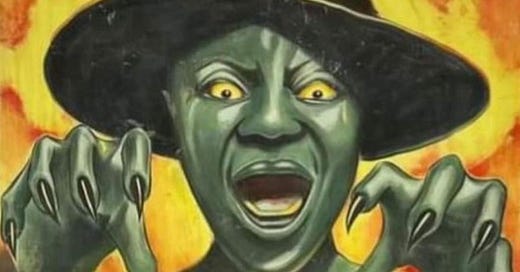



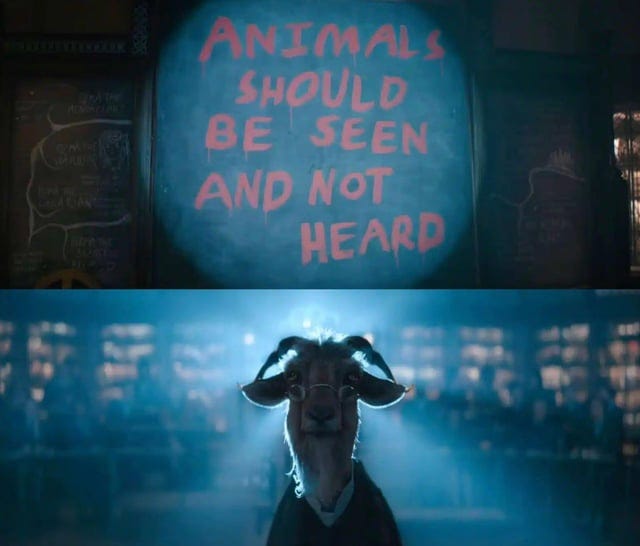
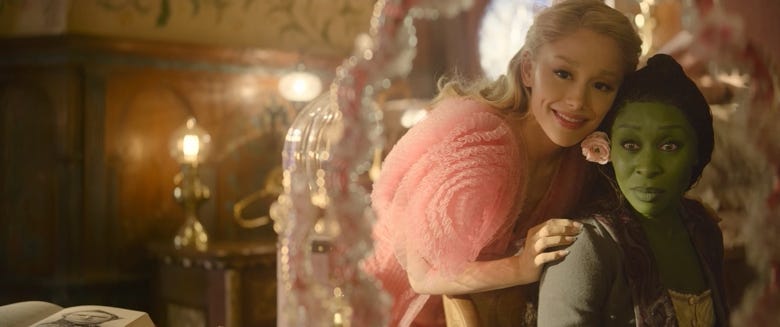


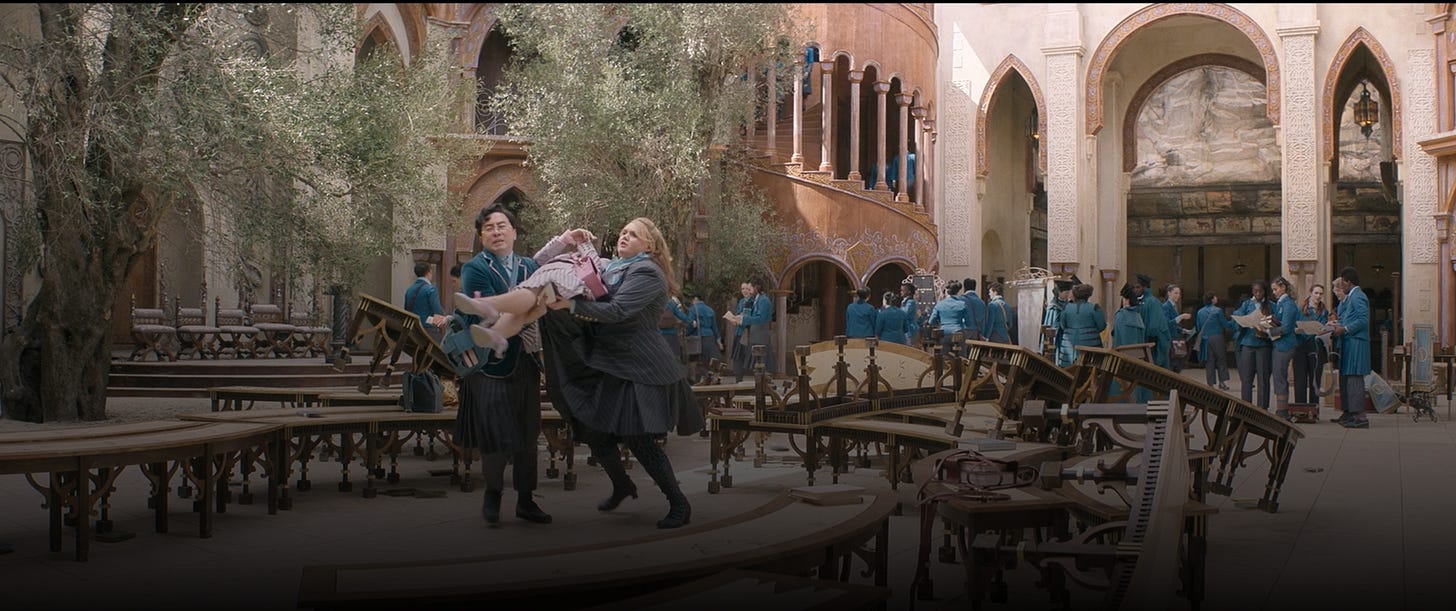

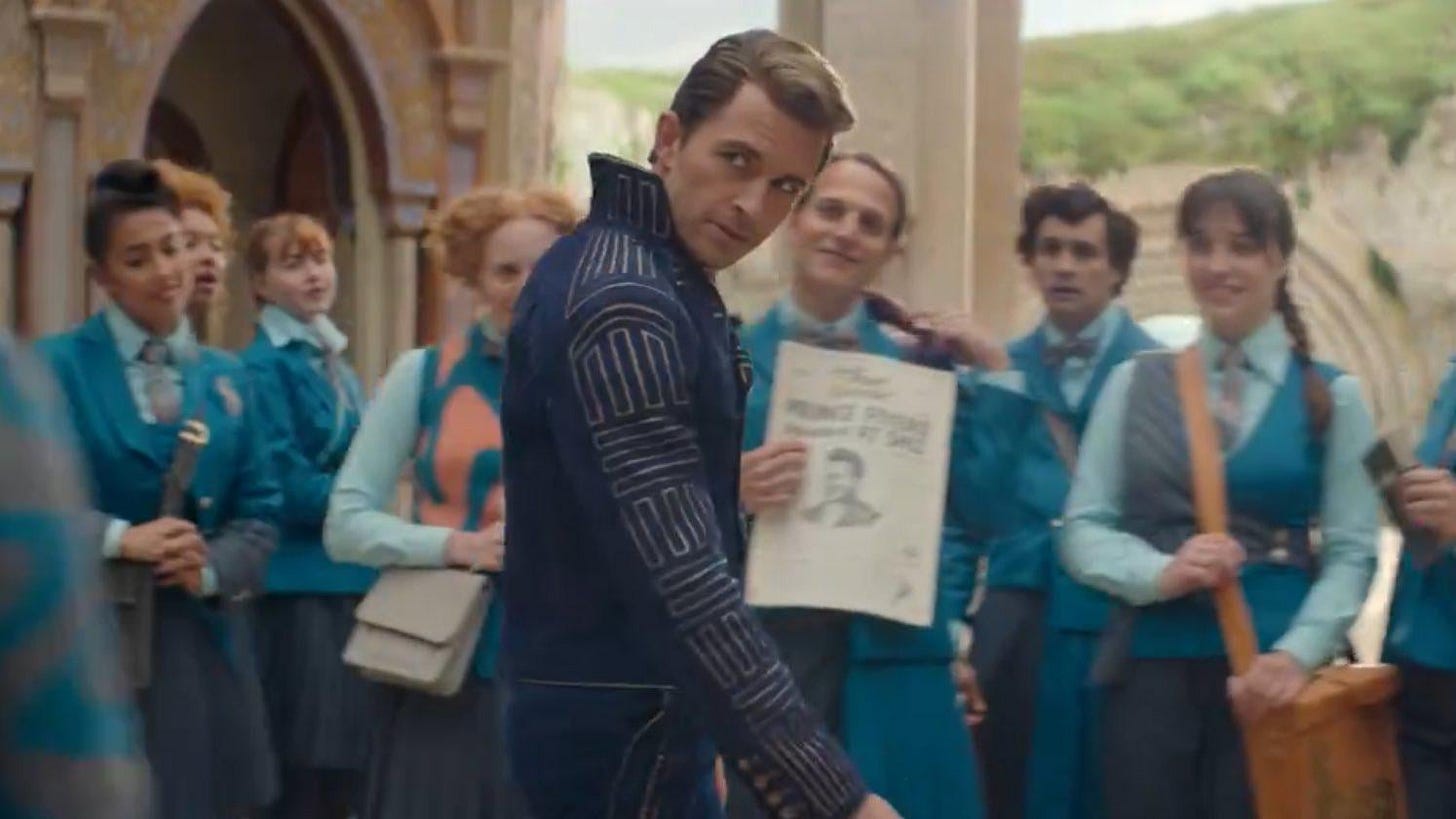

We know and infatuated with these characters, because at certain point of our lives, we are them.
“As a Neurodivergent, Nonbinary girlie I’ve never really fit. I understand the importance of rules, but I don’t give out my respect for authority arbitrarily.”
Go off!!!! Seriously out of all the well stated views you presented here, I feel this the most and I feel that this perfectly captures the feeling of what it means to stand up against authoritarian bullshit ☺️